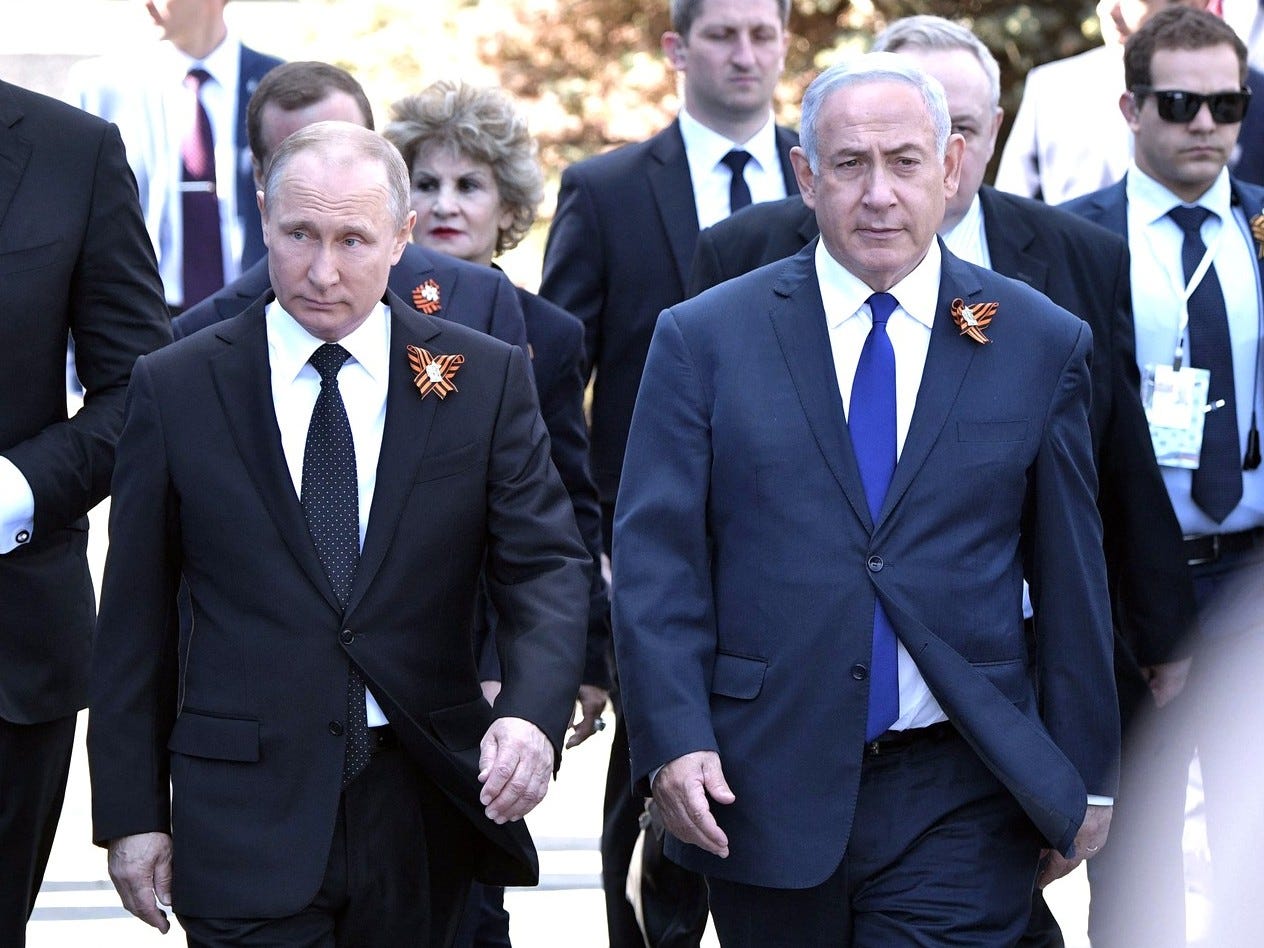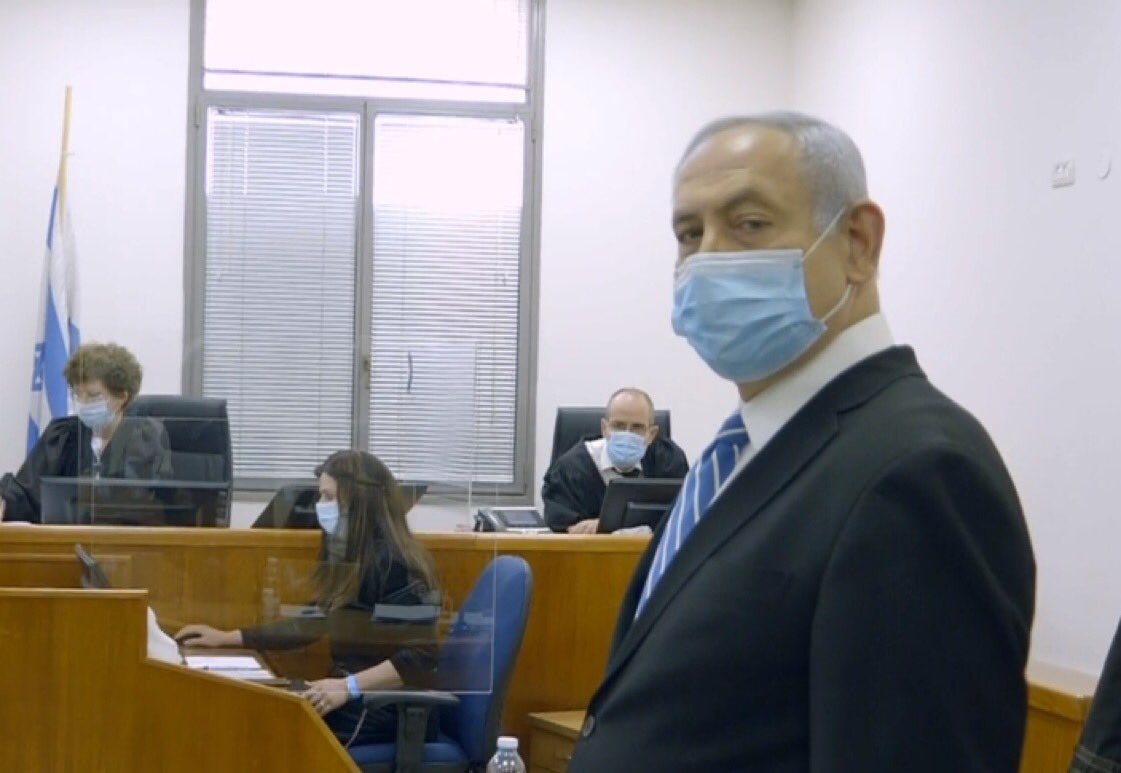'Water Torture': Zero Leverage and the Horrendous Hostage Deal
The inside story of how Benjamin Netanyahu stupendously surrendered Israel's leverage at a time when the Jewish state and the Jewish People need it most.

Editor’s Note: In light of the situation in Israel — where we are based — we are making Future of Jewish FREE for the coming days. If you wish to support our critical mission to responsibly defend the Jewish People and Israel during this unprecedented time in our history, you can do so via the following options:
You can also listen to this essay if you prefer:
Or listen on Apple Podcasts, Google Podcasts, and Spotify
In 1982, a young senator named Joe Biden — that’s right, the same Joe Biden whose America’s current president — levied a threat of diminishing U.S. aid at Menachem Begin, Israel’s then-prime minister.
Begin, in the U.S. Congress’ building, unabashedly replied to Biden:
“Don’t threaten us with cutting off your aid. It will not work. I am not a Jew with trembling knees. I am a proud Jew with 3,700 years of civilized history. Nobody came to our aid when we were dying in the gas chambers and ovens. Nobody came to our aid when we were striving to create our country.”
“We paid for it. We fought for it. We died for it. We will stand by our principles. We will defend them. And, when necessary, we will die for them again, with or without your aid.”
Certainly much has changed since 1982 in America, Israel, and across the Middle East. Among other notable events, America was demoralized by the 9/11 attacks, went on to fight two head-scratching wars in Iraq and Afghanistan, and most recently prodded Vladimir Putin into invading Ukraine by pushing for NATO expansion.
In Israel, we saw two Palestinian intifadas (violent uprisings against the Jewish state), three wars (two with Lebanon and one with Iraq), five failed Israeli-Palestinian peace plans, and Benjamin “Bibi” Netanyahu serving as Israel’s prime minister for something like 18 years (nearly a quarter of the State of Israel’s total existence).
Across the Middle East, Iran has destabilized the region following its revolution in 1979, when the theocratic regime of Ayatollah Ruhollah Khomeini, a religious cleric who headed one of the rebel factions, superseded the Pahlavi dynasty.
Since then, Khomeini has been relentlessly investing in the export of Iran’s Islamic revolution, with the aim of maximizing regional hegemony. As part of this masterplan, the Iranians identify other like-minded rebel groups across the Middle East and North Africa, and turn them into Iranian proxies by supplying them with training, weaponry, and funds to carry out (or stand ready to carry out) “missions” that align with this masterplan.
Experts say Iran hopes to further leverage its growing network of proxies to move equipment and personnel across the Middle East and North Africa — and remove Western powers (i.e. Israel) that stand in its way. In recent years, Iran has sought to improve cooperation among these proxies, with the grand plan of forming a more united “Axis of Resistance” against mutual enemies.
Whereas Saudi Arabia and other Gulf states like the United Arab Emirates are pursuing ambitious plans to diversify their economies, the Iranian regime wants to turn the region into a despotic caliphate, an Islamic form of government led by someone who’s considered a political-religious successor to the Islamic prophet Muhammad.
In pursuing its hegemonic masterplan, Iran has virtually surrounded Israel with its proxies: Hezbollah on Israel’s northern border; Iranian forces in Syria (on Israel’s northeastern border); the Houthis in Yemen, across the Red Sea from Eilat (Israel’s southern-most city); and Hamas and Palestinian Islamic Jihad in the Palestinian territories (on both Israel’s eastern and southwestern).
The only direction Israel doesn’t have an Iranian proxy situated is on its western border, because sitting there is the Mediterranean Sea. Hence why extreme Palestinian factions and their partners (i.e. Iran) talking about “driving the Jews into the sea.” Not exactly encouraging, is it?
There are many reasons why the Jewish state has found itself in this hazardous situation, but when we really boil down to it, the primary person to blame for Israel’s unsettling security circumstances is one Benjamin “Bibi” Netanyahu — and the plot goes back further than most people realize.
In 2015, then-U.S. President Barack Obama and the leaders of the nations known as the P5+1 — China, Britain, France, Russia, and Germany — were using every tool in the international security shed to constrain Iran’s pursuit of nuclear weapons, including negotiating a formal deal.
Make no mistake, these negotiations and the resulting agreement were ridiculously defective, but so too were Bibi’s antics: While leading a country that receives tremendous U.S. support, he ran a multifaceted, multi-phase public campaign against an American president’s agenda, such as bypassing the Obama administration to deliver a joint address to the U.S. Congress, an invitation traditionally extended via the White House.
Not only was his strategy nothing short of a disaster, it failed to stop the deal with Iran, sidelined Israel diplomatically, and injected partisanship into what, until then, had been roundly bipartisan U.S. support for Israel. The Democratic Party has not been unified on support for the Jewish state since.
The reverberations from Netanyahu’s speech have echoed through U.S.-Israeli relations in the years since, and his stubborn rhetoric put Israel in the precarious situation of being further sidelined by the global community. Criticism of him came swiftly, not only from Obama’s party, but from within Israel as well.
“I am also not thrilled about Obama’s policies,” said Yair Lapid, Netanyahu’s former finance minister and current leader of the opposition in the Knesset (Israel’s legislature). “But Netanyahu crossed a line that caused the White House to stop listening to Israel. In the last year of international negotiations, we weren’t even in the arena … and the door to the White House was closed to us.”1
That wasn’t the only line Bibi crossed. In 2017, he was investigated and questioned by Israeli police in two interconnected criminal cases. In one case, he was suspected of having obtained inappropriate favors from businessmen.
And in the other one, Bibi was alleged to try to strike a deal with the publisher of the Yedioth Ahronot newspaper group, Arnon Mozes, to promote legislation that would weaken Yedioth’s main competitor, Israel Hayom, in exchange for more favorable coverage of Netanyahu.
Israeli police went on to confirm for the first time that Netanyahu was suspected of crimes involving fraud, breach of trust, and bribes in these cases. In August 2017, it was reported that the Prime Minister’s former chief of staff, Ari Harow, had signed a deal with prosecutors to testify against Netanyahu in these cases.
Six months later, Israeli police recommended that Netanyahu be charged with corruption, claiming that sufficient evidence exists to indict the prime minister on charges of bribery, fraud, and breach of trust in the two cases. Netanyahu responded that the allegations were baseless and that he would continue as prime minister.
In February 2019, the Israeli attorney general announced his intent to file indictments against Netanyahu on bribe and fraud charges in three different cases. Bibi was formally indicted in November 2019; if convicted, he could face up to 10 years in prison for bribery and a maximum of three years for fraud and breach of trust. Netanyahu is the first sitting prime minister in Israel’s history to be charged with a crime. As of today, the criminal trial is still ongoing.

In 2020, Bibi’s party Likud won the legislative election and he was sworn in for a fifth term as prime minister, against a background of the COVID-19 pandemic and Bibi’s criminal trial. But a year later, the coalition fell apart, ending his 12-year consecutive tenure.
Bibi became leader of the opposition, but his ousting didn’t last for long, as the new coalition sputtered; in 2022, he was reelected as prime minister, forming Israel’s most extreme right-wing coalition in its history.
The first months of Netanyahu’s sixth term were centered around reforms in the judicial branch, which drew widespread criticism and created immense strains in the country’s social fabric, including among its vaunted security and military establishments.
Critics highlighted the negative effects it would have on the separation of powers, the office of the Attorney General, the economy, public health, women and minorities, workers’ rights, scientific research, the overall strength of Israel’s democracy, and its foreign relations.
Reportedly, Netanyahu received two stark warnings from the head of research at the Military Intelligence Directorate in April and July of this year, that the societal divisions sparked by his government’s effort to radically overhaul the judiciary were emboldening Hamas, Hezbollah, and Iran to take actions against the Jewish state.2
“We are seeing a debate among Israel’s enemies over whether to sit on the fence and let Israel continue to weaken itself internally, or to take initiatives and further exacerbate the situation,” Amir Sa’ar wrote in letters apparently sent directly to Netanyahu.
Each of the letters included intelligence that pointed to imminent danger of a military escalation by Israel’s adversaries, which Netanyahu appeared to have dismissed, as he continued to advance the highly controversial judicial overhaul, that sparked months of unprecedented protests across the country.
To add insult to injury, the various governments led by Bibi have, for years, tried to divide power between the Gaza Strip and the West Bank — crippling Palestinian Authority President Mahmoud Abbas, while purposely propping up the Hamas terror group. The strategy was to diminish the likelihood that Abbas, or anyone else in the Palestinian Authority’s West Bank government, could work toward establishing a Palestinian state.
Amid this strategy to restrict the Palestinian Authority, Hamas was effectively elevated from just a terror group to a social-political organization. Hamas was also included in discussions about increasing the number of work permits Israel granted to Gazan laborers, which kept money flowing into Gaza, meaning food for families and the ability to purchase basic products.
Israeli officials said these permits, which allow Gazan laborers to earn higher salaries than they would in the enclave, were a powerful tool to help preserve calm.
Most of the time, Israeli policy was to treat the Palestinian Authority as a burden and Hamas as an asset. Far-right Minister Bezalel Smotrich, now the finance minister in the hardline government and leader of the Religious Zionism party, said so himself in 2015.
According to various reports, Netanyahu made a similar point at a Likud faction meeting in early 2019, when he was quoted as saying that those who oppose a Palestinian state should support the transfer of funds to Gaza, because maintaining the separation between the Palestinian Authority in the West Bank and Hamas in Gaza would prevent the establishment of a Palestinian state.
Bolstered by this policy, Hamas grew increasingly stronger until October 7th, 2023 — the bloodiest day in Israel’s 75-year history — when Palestinian terrorists infiltrated the border, slaughtered hundreds of people, and abducted some 240 more, while thousands of rockets were fired at Israel’s south and center.
President Biden and many other heads of state flew to Israel for a “solidarity visit” and said all the right things. The Americans even moved an aircraft carrier to the eastern Mediterranean at the start of this war, primarily to keep Hezbollah at bay, but let’s not forget: Moving an aircraft carrier and actually using it are two very different things.
During the last handful of weeks, many of Israel’s allies — most notably the United States — started shifting its public messaging to reveal more private pressure and disagreements in their discussions with Israeli officials, against the backdrop of growing international and domestic outcry about Palestinian casualties.
French President Emmanuel Macron even launched a blood libel against Israel on primetime TV, saying that we are “killing women and babies” in Gaza. (He has since walked back his words, but the damage was done.)
For weeks now, Bibi hasn’t managed to secure a hostage deal that would see the return of at least half of the 240 people who were kidnapped. Late last week, reports indicated that Israel was about to agree to an initial, partial deal that would keep some mothers in Gaza while their children went free — until Israel’s war cabinet meeting on November 17th seemed to smack some sense into Bibi.
During this war cabinet meeting, Bibi reportedly phoned Biden and urged him to pressure the Qataris to expand the number of abductees to include in the deal being negotiated between Israel and Hamas, via Qatar.
That all brings us to today, Sunday, November 26th, the third day of a deal and temporary truce between Israel and Hamas that includes the release of 50 living abductees — children, mothers, and other women — in groups of 12-to-13 people over four days. A sort of “dripping"“ effect that one notable journalist has called the “water torture” of Israelis.
In exchange, Israel has agreed to a total military pause during these four days, for the first time since the outbreak of the war, as well as the release of 150 teenage and female Palestinian security prisoners. The halt in the fighting could potentially be extended by an extra day for each group of 10 more Israeli hostages that Hamas can produce and release.
The great news is, hopefully most (if not all) of the children will soon be out of harm’s way and back in Israel with their loved ones. The bad news is, this was a horrendous deal, not because of its timing, but because Israel wasn’t able to (a) secure many more hostages during the initial four-day period, and (b) receive all the abductees on the first day of the temporary truce, or at least increase the number of hostages released each day.
To be sure, Israel’s military incursion into Gaza, which started on October 27th, has been nothing short of phenomenal in beginning to eradicate Hamas from the strip, while significantly upping the pressure on the Palestinians to release many more abductees. Why, then, are we only getting just 20-percent of the abductees to start, released over four days?
The answer is: Bibi.
Over the last several years, the man who became Israel’s youngest-ever prime minster has heavily damaged relationships with some of Israel’s greatest friends, while working tirelessly to dismantle democracy in the Jewish state, against the backdrop of potential criminality. There’s no way that any of this looks even halfway decent in the eyes of Israel’s Western allies.
By doing so, Bibi has stupendously surrendered his personal — and, as an extension, Israel’s — leverage at a time when Israel, Israelis, and the Jewish People need it most.
After all, politics is really just a game of leverage, and if you don’t have much leverage, you might as well wait until you can accrue more of it. But when you’re dealing with intense international pressure, time is not in the least on your side. Hence why Bibi was forced to accept this horrendous deal.
Michael Shear, a White House correspondent for The New York Times, corroborated this reality, writing:
“Israel’s acceptance of the terms of a hostage deal with Hamas reflected the intense pressure brought by the Biden administration to reach an agreement that would free some of those held by the armed group and produce potential longer-term opportunities to de-escalate the conflict.”3
Shear added that “the arrangement was also the latest example of the widening breach” between the White House and Netanyahu.
All this at a time when the Jewish state absolutely needs its allies the most, at a time when Israel is desperate for a formidable leader like Menachem Begin, who cofounded Likud, the very party that Bibi has chaired all these years.
If Begin only knew where Bibi has led us, the Jewish state and the Jewish People, he’d be appalled beyond belief.
“Years ago, Netanyahu made a major mistake. The world is still paying the price.” MSNBC. https://www.msnbc.com/opinion/msnbc-opinion/netanyahu-us-israel-relations-mistakes-rcna124284.
“Top intel official twice warned Netanyahu that judicial overhaul was emboldening Hamas to strike — report.” The Times of Israel. https://www.timesofisrael.com/liveblog_entry/top-intel-official-twice-warned-netanyahu-that-judicial-overhaul-was-emboldening-hamas-to-strike-report.
“Political Pressures on Biden Helped Drive ‘Secret Cell’ of Aides in Hostage Talks.” The New York Times. https://www.nytimes.com/2023/11/21/us/politics/biden-hostage-talks-israel-hamas.html#:~:text=The%20initial%20approval%20of%20the,of%20last%2Dminute%20disputes%20that.




The United States, especially under Obama, wants to undermine and ultimately destroy Israel. Moving two aircraft carriers is not to protect Israel-it is to protect US bases in the Middle East, which are now being regularly attacked. You deliberately fail to mention the billions of dollars the US is presently giving Iran, or for that matter the failure to impose sanctions on Iranian oil. You seem to have forgotten the lack of support for the uprising in Iran by Obama. You don’t notice the failure to impose sanctions on Iran for their development of nuclear weapons. Bibi addressed a legislative body in the US which contained some pro-Israeli members and ignored a president who is anti-Israel. He got some publicity. You want Bibi to do a full Ben-Gurion with Obama? Then have the guts to say it !
During the 2014 Gaza War, after Israel had mobilized and was ready to do some serious damage, Obama/Kerry put the brakes on. Obama had the FAA block all US flights into Ben-Gurion because it was "too dangerous," and he delayed the resupply of ammunition. Israel finds itself in the same situation today where the resupply of ammunition (that Israel is contractually prohibited from producing on its own) depends on staying on America's good side. Biden is apparently "very pleased" with the cease-fire arrangements that his brilliant diplomacy has achieved, and Bibi has little choice but to put a brave face on it. Hopefully this experience will convince Israel that it needs to build its own bombs and missiles if it wants to have them available and be free to use them when needed.